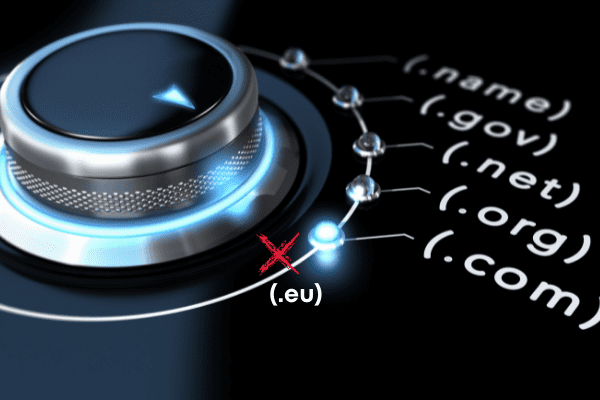In the beginning of this year, the EURid (the organisation in charge of managing .eu domain names) announced that 81,000 .eu domain names would be suspended as a result of Brexit. Those domain name holders now have three months to prove that they are entitled to the .eu domain name. This event is a perfect moment to refresh the importance of a good domain name policy.
European domain names
.eu domain names are top-level domain names (TLDs) managed by EURid (European Registry for Internet Domains).
These domain names are reserved for:
- Citizens of the EEA (EU + Norway, Iceland and Liechtenstein), even if they no longer live in the EEA.
- Residents of the EEA, irrespective of their nationality.
- Companies established in the EEA.
- Organisations established in the EEA.
Individuals and companies that do not belong to one of these categories cannot apply for or hold a .eu domain name. As a result of Brexit, 81,000 .eu domain names were suspended at the beginning of this year. In practical terms, this means that these .eu websites and email addresses are no longer accessible since the beginning of 2021.
The domain name holders in the UK now have another three months to update their data. They can, for example, establish their registered office within the EEA or prove that they have the nationality of an EEA member state in order to keep their domain name. The well-known pro-Brexit website and campaign Leave.EU has moved its registered office to Waterford in Ireland to be able to keep its domain name. If a domain name holder cannot prove the above, their .eu domain names will be officially cancelled and consequently released to the public from January 2022.
Checks for registration
This incident is the perfect moment to refresh the importance of a good domain name policy.
Make sure that you don’t thoughtlessly search all databases for available domain names. That is how you awaken the cybersquatters. These are individuals who want to get hold of your domain name in order to sell it to you at a higher price, or place harmful content on it in order to give you a bad name, or want to profit from your good reputation, etc. You can easily prevent this by timely registering the relevant and crucial domain names:
- Make a list of all possible names and possible spelling mistakes. Perhaps also think about the domain name of your own name!
- Think carefully about which extensions you want to register.
- Register all names and extensions as soon as possible.
In itself this all seems obvious, but you would be surprised how often it goes wrong in practice. Often, certain extensions are not registered to reduce costs, but it has already happened more than once that a competitor or an unknown third party registers the other domain names to make a profit. Then, of course, there are possible legal steps you can take. For example, there are a number of alternative dispute procedures at the domain name registrars. In many cases, however, you will need to have a registered trademark to have a chance of justice. By the time you have gone through such a procedure, the damage may already be irreparable or your costs may have risen considerably.
Preventing is better than curing
Our team will be happy to help you with any questions concerning domain names, trademarks or intellectual property and the Internet in general. Feel free to contact us at bart@siriuslegal.be and matthias@siriuslegal.be.
This article was written by Matthias Vandamme who has left our firm a while ago.

